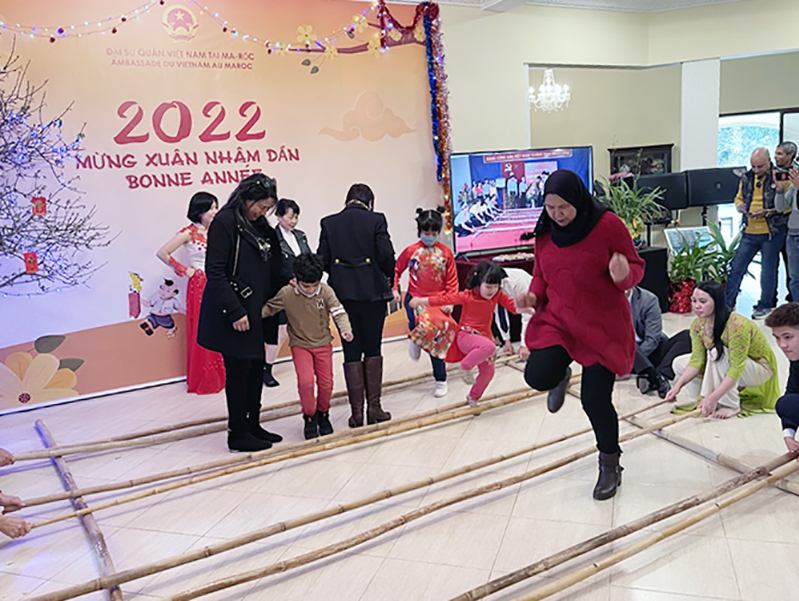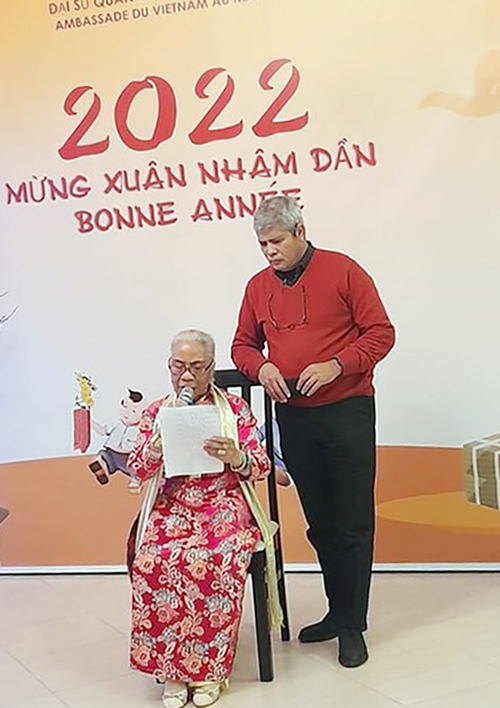Celebrating Tet (Lunar New Year) for the first time in 33 years, Tran Thi Hong May could not hide her emotions.
“After living half my life far away from Vietnam, I finally got to smell Tet dishes again and it made a Vietnamese like me tear up,” the 80-year-old, chairwoman of the Vietnamese Association in Morocco, says about the first ever Tet celebration hosted by the Vietnamese embassy in 2005.
May and her Moroccan husband had met in Vietnam.
He had been in the French army and sent to the Dien Bien Phu battle in 1953. At that time war had also broken out against the French in Morocco.
Coming to Vietnam, a young man like her husband found it pointless to pick up a gun and fight against a country that was trying to regain its freedom.
They ran away together and joined the Viet Minh. After the Dien Bien Phu victory, responding to a call by President Ho Chi Minh, over 300 North African soldiers and 100 Vietnamese went to the mountains of Ba Vi to till the virgin soil and set up farms. That was when love bloomed between May and her husband.
They left for Morocco in 1972.
 |
|
Vietnamese celebrate Tet at the Vietnamese Embassy in Morocco. Photo courtesy of May. |
Most Moroccans are Muslim and celebrate the new year in May or June based on the Arabic calendar.
“There is no pork here, no sticky rice, nothing for Vietnamese living far from home like me to celebrate Tet,” May says.
For a long time there was no Vietnamese embassy in Morocco. For a letter to reach Vietnam and a reply to come would take six to eight months. Every time she missed home May would look at pictures of her mother and other relatives, while constantly pining to visit Vietnam one day.
Without a lunar calendar or contact with any Vietnamese, Tet for May was simply the peach blossom trees in her garden. During the season, at the end of each day, she would take a chair to the garden to just sit and watch the flowers in bloom. When she was busy she would cut a few branches and take them inside the house.
In the early 2000s, Meknes City, where she lived, began to get Chinese supermarkets, and there one could buy sticky rice, mung beans and other ingredients needed to make some Vietnamese dishes.
Since then for Tet she would cut banana leaves and make banh chung, using beef for the filling instead of pork. May and her family have been celebrating the Vietnamese New Year since then.
In 2005, Vietnam opened an embassy in the Moroccan capital Rabat, and May was invited there to celebrate Tet.
After 33 years in her husband’s country she finally met Moroccan-Vietnamese families. Together they watched the peach trees bloom in the embassy and ate Vietnamese dishes such as banh chung, fried spring rolls and sticky rice made the authentic way.
“I have felt the taste of Vietnam again after nearly 40 years. That would make anyone who has been living far from Vietnam like us emotional”.
Zong Allam Mahamuod, 62, is a Vietnamese-Moroccan. Born to a Moroccan father and Vietnamese mother, his Vietnamese name is Dung. He and his parents came to Morocco when he was 13, and live in a village in Kenitra Prefecture along with seven other Vietnamese-Moroccan families.
Living in a Vietnamese community, he still speaks his mother’s language well despite having left Vietnam almost 50 years ago.
He says: “When I came to Morocco there were no Tet celebrations. When I was invited to celebrate Tet at the embassy 17 years ago, childhood memories came flooding back.”
Nguyen Thi Nhung, his mother, was a terrific cook who taught her children to cook Vietnamese dishes at a young age. At 17, Dung went to work in the kitchen and later became a chef at a famous five-star hotel chain in Rabat. Four other siblings also pursued a career in the kitchen, influenced by their mother.
In addition to banh chung, Nhung also makes the braised beef, fried spring rolls, and even pho.
“My mother makes the best Vietnamese food,” Dung says.
In recent years, Nhung and her husband have been living in France. So, instead of gathering at home, Dung often drives hundreds of kilometers to Rabat to celebrate Tet at the embassy.
Dung often cooks Vietnamese dishes to treat people who come there to celebrate Tet.
“I go there early every year and only return home at 11 p.m.,” he says.
In 2021 shops selling Vietnamese goods in Morocco closed due to the Covid-19 pandemic. But Nhung, returning from France to visit her family, brought along a lot of Vietnamese goods.
On the 60th anniversary of the establishment of diplomatic relations between Vietnam and Morocco in July last year, Nhung woke up early and cooked big portions of mung bean sticky rice and hundreds of fried spring rolls and took them to the embassy for visitors.
Dang Thu Ha, Vietnam’s ambassador to Morocco, says: “For Vietnamese here, celebrating Tet is an essential part of every year. People usually bring food from home for everyone to eat together”.
Both May and Dung like poetry, especially those about the homeland and Vietnam.
 |
|
Hong May and Zong Allam Mahamuod (Dung) read a poem at the Vietnamese Embassy in Morocco. Photo courtesy of May |
This year, during the Tet celebrations at the embassy on January 21, they read a poem hat May had composed.
“No matter the place
Remember where you’re from
Warm wishes of love
Shine like a radiant light”
- Reduce Hair Loss with PURA D’OR Gold Label Shampoo
- Castor Oil Has Made a “Huge” Difference With Hair and Brow Growth
- Excessive hair loss in men: Signs of illness that cannot be subjective
- Dịch Vụ SEO Website ở Los Angeles, CA: đưa trang web doanh nghiệp bạn lên top Google
- Nails Salon Sierra Madre
 VnExpress News The News Gateway of Vietnam
VnExpress News The News Gateway of Vietnam
